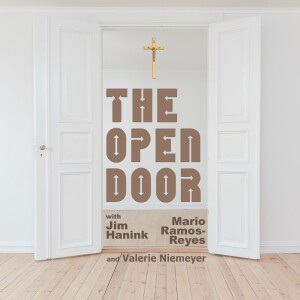
Episode 276: Eilev Hegstad of Norway, editor of "Kristendemokrati" (January 24, 2024)
 2024-01-24
2024-01-24
Download
Right click and do "save link as"
This week on The Open Door (January 24th) we virtually visit Norway. What’s going on with Christian Democracy there and in nearby Sweden? What sources do our Scandinavian friends draw on to build a creative alternative to politics as usual? What sources do we in the US share with them? Our welcome and special guest is Eilev Hegstad. He is working on a PhD with the title "The role of ethics committees and moral experts in democracy". Hegstad has a master's degree in political science from the University of Oslo. His professional interests are the role of knowledge and expertise in politics, ethics committees, democratic theory, and political ideologies. He has done research at Oxford University. In 2023, the book "Kristendemokrati" which he edited came out. We’ll be asking him the following questions.
view more
- How did Christian Democracy come to the Nordic countries?
- In what ways has its development been distinctive?
- The core principles of Christian Democratic thought include subsidiarity, solidarity, social market economy, and popularism. Could you explain them to us?
- Could you please introduce us to some of the major Scandinavian proponents of Christian Democracy?
- There’s an old line that an expert is someone from 20 miles away. But surely there’s more involved than that. What’s required to be, say, a moral expert?
- There’s another old line that dismisses a poorly written document as the work of a committee. What’s the task of an ethics committee and how can we tell if it’s achieved?
- Democracy is not without its puzzles. When if ever is pure democracy feasible?
- What do you make of the Anscombe Paradox, namely that in a majority of instances the majority might be in the minority?
- Does political authority rest on convention, contract, consent, or something other than these?
- A bonus question: Do you think that Magnus Carlsen’s chess brilliance would lend itself to political analysis? After all, Gary Kasparov might serve as his mentor!
More Episodes
WCAT Radio The Open Door (January 17, 2020)
 2020-01-18
2020-01-18
 2020-01-18
2020-01-18
WCAT Radio The Open Door (January 10, 2020)
 2020-01-10
2020-01-10
 2020-01-10
2020-01-10
WCAT Radio The Open Door (January 3, 2020)
 2020-01-04
2020-01-04
 2020-01-04
2020-01-04
WCAT Radio The Open Door (December 13, 2019)
 2019-12-13
2019-12-13
 2019-12-13
2019-12-13
WCAT Radio The Open Door (December 6, 2019)
 2019-12-04
2019-12-04
 2019-12-04
2019-12-04
WCAT Radio The Open Door (November 22, 2019)
 2019-11-23
2019-11-23
 2019-11-23
2019-11-23
WCAT Radio The Open Door (November 15, 2019)
 2019-11-16
2019-11-16
 2019-11-16
2019-11-16
WCAT Radio The Open Door (November 8, 2019)
 2019-11-08
2019-11-08
 2019-11-08
2019-11-08
WCAT Radio The Open Door (November 1, 2019)
 2019-11-01
2019-11-01
 2019-11-01
2019-11-01
WCAT Radio The Open Door (October 25, 2019)
 2019-10-27
2019-10-27
 2019-10-27
2019-10-27
WCAT Radio The Open Door (October 18, 2019)
 2019-10-18
2019-10-18
 2019-10-18
2019-10-18
WCAT Radio The Open Door (October 11, 2019)
 2019-10-13
2019-10-13
 2019-10-13
2019-10-13
WCAT Radio The Open Door (October 4, 2019)
 2019-10-02
2019-10-02
 2019-10-02
2019-10-02
WCAT Radio The Open Door (September 6, 2019)
 2019-09-06
2019-09-06
 2019-09-06
2019-09-06
WCAT Radio The Open Door (August 30, 2019)
 2019-08-30
2019-08-30
 2019-08-30
2019-08-30
WCAT Radio The Open Door (August 23, 2019)
 2019-08-25
2019-08-25
 2019-08-25
2019-08-25
WCAT Radio The Open Door (August 16, 2019)
 2019-08-17
2019-08-17
 2019-08-17
2019-08-17
012345678910111213141516171819
Create your
podcast in
minutes
- Full-featured podcast site
- Unlimited storage and bandwidth
- Comprehensive podcast stats
- Distribute to Apple Podcasts, Spotify, and more
- Make money with your podcast
It is Free
- Privacy Policy
- Cookie Policy
- Terms of Use
- Consent Preferences
- Copyright © 2015-2024 Podbean.com




